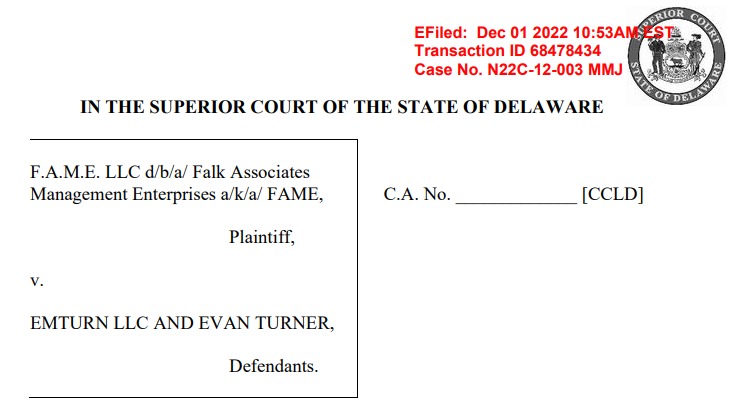You may recall a December 2022 article on this website that discussed the lawsuit filed by sports agent David Falk’s agency F.A.M.E. LLC against former NBA player Evan Turner and his corporate entity EmTurn LLC, where FAME claimed that it provided services to Turner throughout his career and that Turner, along with his company, failed to make agreed-upon payments as well as provide consideration for the reasonable value of those services that FAME delivered.
The crux of the case is that FAME says it is due $2 million from Li-Ning stock that was sold by Turner/EmTurn, which is 20% of the $10 million that the player allegedly earned from the sale. Falk says he negotiated the Li-Ning deal and that Turner had paid him commissions on it in the past.
You knew Turner would fight back, and he recently showed some of his cards in a motion to dismiss the lawsuit. The basis for the motion is that Turner, individually, cannot be named as a party. FAME failed to plead that an enforceable oral contract exists between it and Turner and Turner says that he was never a contracting party concerning the alleged Agency Agreement between FAME and Turner’s company, EmTurn.
“Plaintiff finally asserts threadbare allegations that Mr. Turner is the ‘alter
ego’ of EmTurn, and he should be liable for any misconduct on EmTurn,” states the motion to dismiss. “Not only has Plaintiff fallen woefully short of the extremely high burden to state an alter ego claim, but this Court also lacks jurisdiction to pierce the corporate veil of EmTurn to hold Mr. Turner personally liable.”
As I wrote in the December 2022 article, interestingly, the Complaint notes that the oral agreement was confirmed in a later written agreement, but the written agreement was not attached as an exhibit to the Complaint. Turner has now made that written agreement available for public consumption because he attached it as an exhibit to the motion to dismiss.
Dated August 31, 2010 and in letter form, the agreement is intended to confirm the understanding between EmTurn, LLC and FAME. Notably, Turner’s name is absent as a party to the arrangement and he signed as a member on behalf of EmTurn, LLC, but not in his individual capacity. It is true that the company agreed to refer to FAME all leads, inquiries, and offers, and that FAME was entitled to certain commissions.
One question is, did FAME screw up by not making the agreement between it and EmTurn, LLC as well as Turner? In drafting contracts for many sports agencies, I typically make representation agreements to be binding between the agencies and the individual client, with a paragraph making clear that any entities owned or created by the client is also bound to make commission payments for monies it receives. Here, it appears that FAME failed to get the extra assurance that not only did Turner’s company have the obligation to make payments, but also Turner himself.
Another question is whether the agreement actually allows FAME to earn a commission on the sale of stock. While the agreement does make it pretty clear that FAME is due a percentage of the compensation received by EmTurn, LLC, it does not define that term to include the receipt of stock. Typically, agent/player agreements like this will have a greater level of specificity to make clear that agents may receive proceeds from the sale of stock earned by way of endorsement or marketing contracts.
But the biggest question will be whether FAME can effectively pierce the corporate veil and go after Turner even though he was not technically a party to the agreement at issue. If EmTurn, LLC merely diverted funds due to FAME by way of passing it through to Turner, then I do think FAME has a strong argument to make here. But there is also a highly technical argument made in the motion to dismiss, arguing that only the Court of Chancery in the State of Delaware may pierce the corporate veil and this case was brought instead in the Superior Court.
